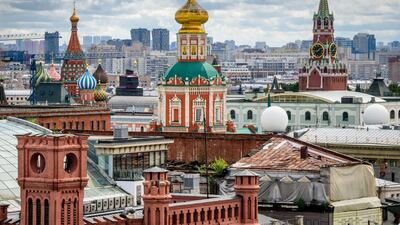Mortgage subsidies introduced in Russia this year to stimulate the economy have fuelled a surge in apartment prices even as incomes plunge to the lowest level since 1998.
Real estate developer PIK said it has seen a surge in demand right across the nation of 147 million after new government mortgage subsidies were introduced in April. In Moscow, prices have jumped 10 per cent in the past three months, according to Andrey Ryabinsky, a co-owner of MITS, a Moscow-based group of construction and real-estate companies.
The subsidies were introduced, alongside interest rate cuts, to try to inject some life into an economy that had already suffered years of stagnation before the global pandemic and slump in demand for oil, Russia’s biggest export earner.
But the lower rates have fuelled demand even as the supply of new housing isn’t growing, thus pushing up prices. With incomes unlikely to recover soon, that could leave borrowers stuck with loans they can’t afford.
“The authorities think that if they pump subsidies into mortgages, it will revive the economy,” said Oleg Vyugin, a professor at Moscow’s Higher School of Economics, who warned a bubble is already forming. “It won’t work. To revive the economy, we need an increase in incomes.”
The concerns have reached the Kremlin, with a top official reassuring President Vladimir Putin in a televised meeting this week that the government is working to boost new construction so prices don’t take off further.
Central bank interest rate cuts pushed average mortgage lending rates down to 7.5 per cent in June, the lowest level in recent Russian history, according to real estate researcher Cian. A government-funded programme that will run until November gives all Russians access to a 6.5 per cent mortgage if they are buying a new apartment.
Subsidies from before the pandemic that offer lower rates to families and 2 per cent mortgages for citizens of the country’s sparsely-populated Far East will remain in place beyond November.
The number of mortgages issued in the first half in the Sverdlovsk region jumped 12 per ent compared to a year earlier, and 8.4 per cent in Novosibirsk region, according to Cian.
The stimulus has created “explosive” growth in lending and could create a housing bubble because some people aren’t solvent enough to repay their loans, deputy finance minister Alexei Moiseev said last month.
About one-third of the 277 billion rubles ($3.8bn/Dh14bn) in mortgages that banks lent in June were subsidised, according to real estate research house Dom.rf. Housing loans grew 29 per cent in June from a year earlier.
In wealthier parts of the country, such as Moscow, the price surge has also been aided by an increase in savings as border closures limit travel abroad. Meanwhile, 250 basis points of interest rate cuts in the past year have increased demand for alternatives to bank deposits.
“People whose incomes remained intact and who had savings are propping the market up right now,” said Oleg Repchenko, an expert from the Moscow-based researcher IRN.ru. “But overall incomes have fallen, so it’s not sustainable.”

